Will you marry me in Japanese? Stop! No! Oh lord, help me! Look, I don’t want you to marry me. I just want you to learn how to say this question in Japanese. This is a great lesson if you want to get married one day… or just ask every person you meet!
Take this lesson…
- Read, review, and read out loud
- Print it out as physical review material (I like printing stuff)
- Save images for your personal use (as flashcards)
- Send it to a lover
✅ And if you REALLY want to learn Japanese with complete learning program – 2,000+ audio/video courses, lessons by Japanese teachers, apps, study tools – Sign up at JapanesePod101 (click here) and start learning! I recommend ’em as a teacher & learner.
Marry Me in Japanese – Basic Questions & Phrases
1. Will you marry me?
- 結婚してくれませんか。
- Kekkon shite kuremasen ka.
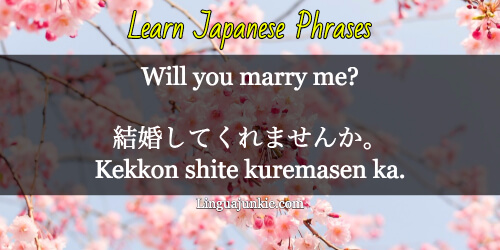
2. I want to marry her.
- 彼女と結婚したい。
- Kanojo to kekkonshitai.
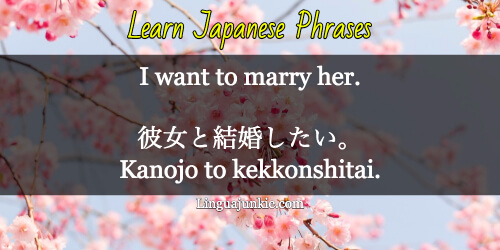
3. I’m going to propose to her.
- 彼女にプロポーズするんだ。
- Kanojo ni puropoozu suru nda.
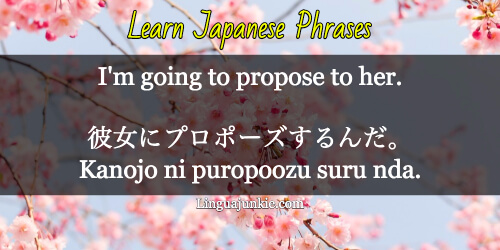
Now the above are the basic marriage lines in Japanese. If you want to get REAL serious about lockin’ it down, you’ll want these.
These are NOT taken from the English language; they’re Japanese. So, if they sound a bit “unusual” to you, it’s okay.
Marry Me in Japanese Part 2 – Romantic Proposals
4. I want to make today our wedding anniversary.
- 今日を二人の結婚記念日にしたい
- kyou o futari no kekkon kinenbi ni shitai
Futari means two people but in this case it refers to “us” – the speaker and the listener. Kekkon is obviously marriage and kinenbi is anniversary.
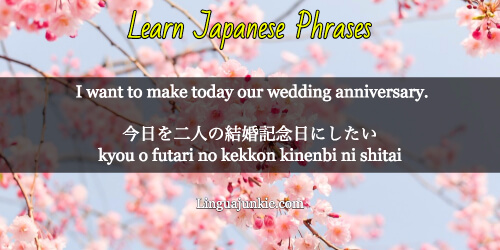
5. Will you create a happy family with me?
- 僕と幸せな家庭を作りませんか?
- Boku to shiawasena katei o tsukurimasen ka?
Ooh, right in the feelings. Creating a happy household is a great dream for some. You’ll get ‘er good with this one. Now, shiawase means happy, katei is household or family and the tsukurimasen ka is won’t you make? Basically, it’s the verb – tsukuru – to create/make – conjugated to mean “won’t you?”
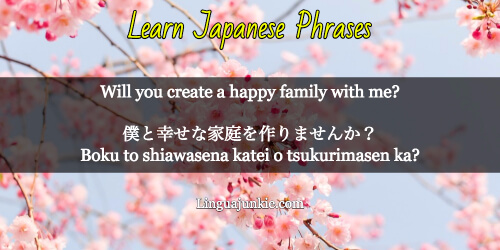
6. I can only imagine a future with (name/you).
- (名前)との未来しか考えられない
- (Add name here) to no mirai shika kangaerarenai.
You’re thinking, “wait, kangaerarenai means can’t imagine/think, so why does it mean only imagine?” Well, when you use the word shika with a verb in the negative, it becomes only. So, if you ONLY ate an apple, you would say ringo wo shika tabenakatta.
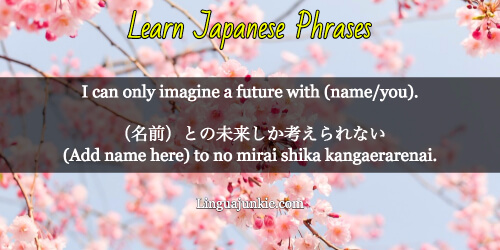
Oh, and mirai means future. Great word. You could name your kid that!
7. Let’s create a warm, forever-smiling family.
- 僕と笑顔の絶えない暖かい家庭を作ろう
- boku to egao no taenai atatakai katei o tsukurou
Sound a bit odd? Well, maybe in English. In Japanese, it’s fine. So, let’s break it down.
- egao – smile/smiling face
- taenai – to not stop, to not die out
- (taeru means to die out or be stopped)
- atatakai – warm
- katei – household
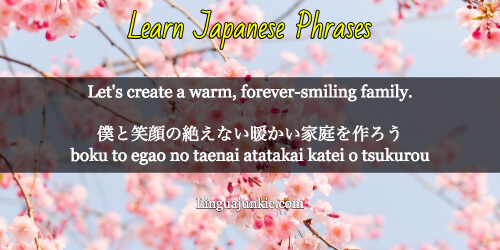
8. From here on in, please always be by my side.
- これからもずっと俺の隣にいてください
- korekara mo zutto ore no tonari ni ite kudasai
In fact, we can drop kore kara from the translation. It’s used a lot in Japanese but can be dropped.
- korekara – after this,
- zutto – always
- tonari – next

Marry Me in Japanese Part 3 –Direct Proposals
Okay, here are some direct ways to say will you marry me in Japanese.
9. Let’s get married.
- 結婚しよう
- kekkon shiyou

10. Will you marry me?
- 結婚するか
- Kekkou suru ka

11. Let’s get married?
- 結婚しようか
- kekkon shiyouka
VERY similar to #9. Remember, the ka indicates that it’s a question so in this case, you’re asking rather than suggesting.

12. Let’s be together.
- 一緒になろう
- isshou ni narou
For those that don’t know, isshou means together.
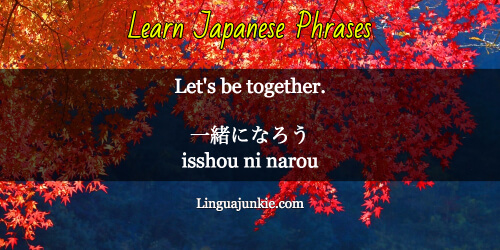
13. Marry me.
- 俺と結婚してくれ
- boku to kekkon shite kure
This is as direct as you’d get. Why do we add kure? Because kure comes from the verb kureru, meaning to give (used in only in situations someone gives you.) You add it after a verb in -te form. You use this when asking someone to do something or give something to you. In this case, get married with you.

Marry Me in Japanese Part 4 –Indirect Proposals
Why indirect!? Well, Japanese is not a very direct language and the people are not very direct either. So, sometimes, a lot depends on CONTEXT rather than the actual words.
Let’s get into it.
14. Where shall we go for our honeymoon?
- 新婚旅行どこ行?
- shinkon ryokō doko ikou ka?
Shinkon means newly-wed and ryokou means travel. When cominbed, shinkonryokou means honeymoon.
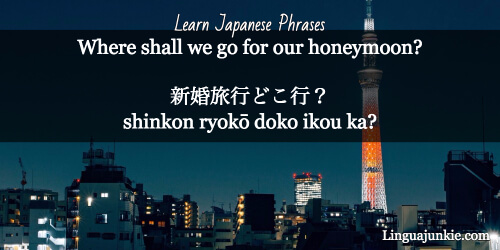
15. I want you to use this inkan from now on.
- この印鑑をこれから使ってほしい
- Kono inkan o korekara tsukatte hoshii
What’s an inkan? It’s a personal stamp that the Japanese use to sign documents with. They don’t usually write out their names but have a custom-made stamp with their last name on it. That way, their stamp will always be the same.
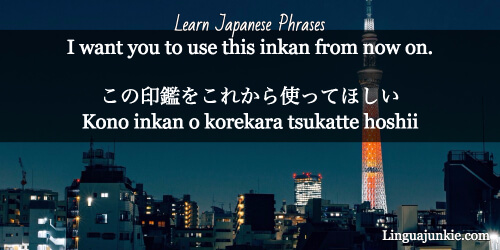
So here, you’re asking her to use your family name. In other words, you’re saying “babe, use my name because I want you to marry me.”
16. Tell me your finger size. The left-hand ring-finger.
- 指輪のサイズ教えて?左手薬指の
- yubiwa no saizu oshiete? Hidarite kusuriyubi
In Japanese, the ring finger isn’t called a ring finger. It’s called a kusuruyubi. But, it refers to the 4th finger. Yubiwa means finger. Saizu is obviously size (duh). And, hidarite is left hand.
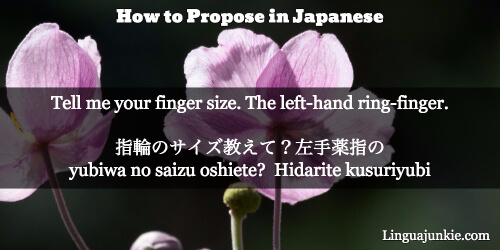
Now why would you ask a girl that?
Because you want to be indirect about it! ( ͡° ͜ʖ ͡°)
17. Won’t you take on my name soon?
- そろそろ俺と同じ苗字にならない?
- sorosoro ore to onaji myouji ni naranai?
Sorosoro means soon or steadily. Onaji is same. Myouji is family name/last name. And you get the rest. Not very romantic, though. I imagine soon can be dropped from the translation to make more sense.
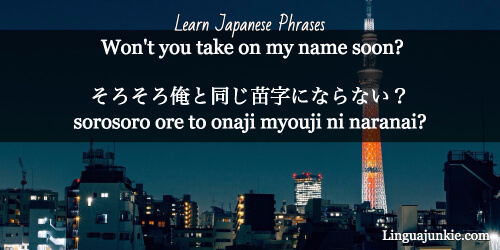
18. Won’t you end the single life soon?
- そろそろ独身生活終わりにしない?
- Sorosoro dokushin seikatsu owari ni shinai?
Dokushin means bachelor or single and seikatsu is daily life. So, won’t you stop being single and start being double … with me?
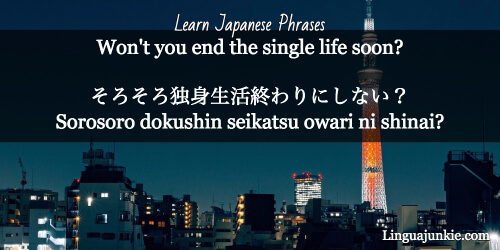
Marry Me in Japanese Part 4 – Imagine the Future!
19. (Name), won’t you entrust the rest of your life to me?
- (名前)の残りの人生、俺に託してくれませんか?
- (namae) no nokori no jinsei, ore ni takushite kuremasen ka?
Won’t you entrust the rest of your life to me? As in, you will take care of her for the rest of her life. Nokori means remaining, jinsei means life, and takushite is the verb takusu meaning to entrust.
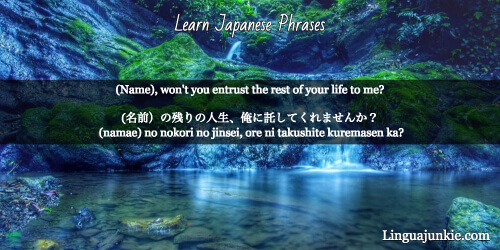
20. No matter how old, I always want to laugh together with you, (Name).
- 何歳になっても(名前)とずっと笑い合っていたい
- Ikutsu ni natte mo (namae) to zutto warai atte itai
In other words, let’s laugh together forever!

21. I want to create all kinds of memories with you so let’s get married!
- これから二人でいろいろな思い出を作っていきたい、だから結婚しよう
- korekara futari de iroirona omoide o tsukutte ikitai,dakara kekkon shiyou
Not a completely literal translation but an interpretation. As mentioned away above, futari means two people but here it refers to us or you and I. Then, iroiro means various or all kinds. Omoide is memory. And so, will you marry me in Japanese!?

22. I want to be next to you and see you as a bride, as a mother and as you age.
- 花嫁姿も子育てしてる姿もおばあちゃんになった姿も全部隣で見ていたい
- hanayome sugata mo kosodate shi teru sugata mo o baachan ni natta sugata mo zenbu tonari de mite itai
Okay, the English language and Western culture doesn’t give aging any respect so obaachan ends up meaning grandma or old lady. Hanayome means a bride in a wedding gown, kosadate means child rearing and sugata means shape, condition or state.
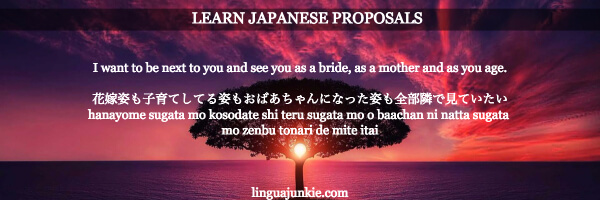
And you want to see all of that while being next to her.
Now that’s deep.
And here you go. These are just some 22 ways to ask will you marry me in Japanese. There’s TONS more because Japanese is a pretty creative language. We can all be pretty creative if we can be indirect and poetic… like… won’t you cook my dinner for me?
– The Main Junkie
P.S. I highly recommend this for Japanese learners. If you REALLY want to learn Japanese with effective lessons by real teachers – Sign up for free at JapanesePod101 (click here) and start learning!

